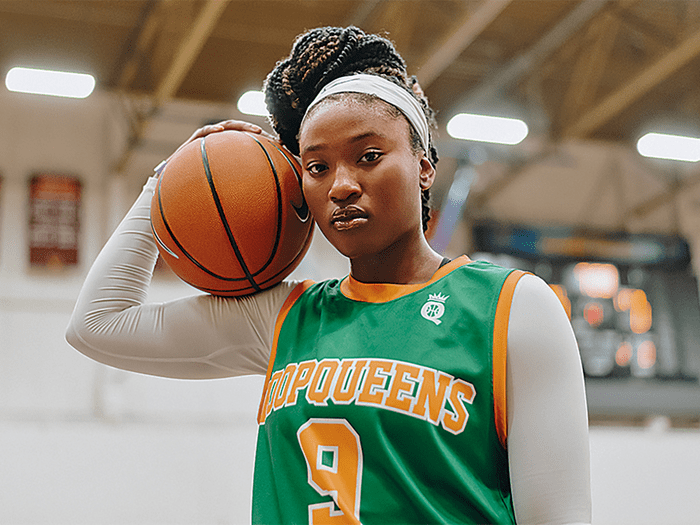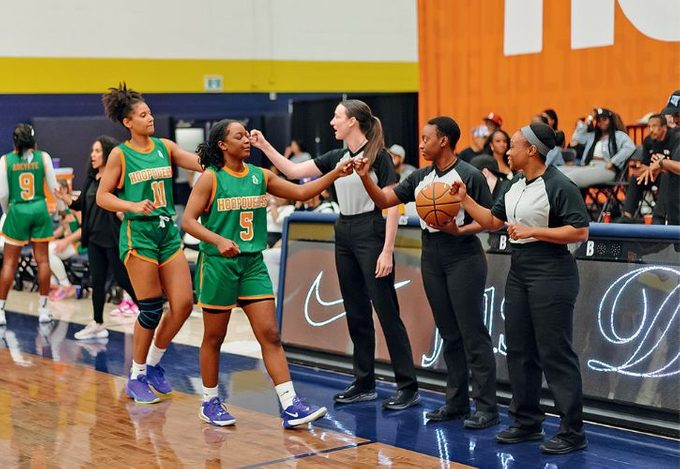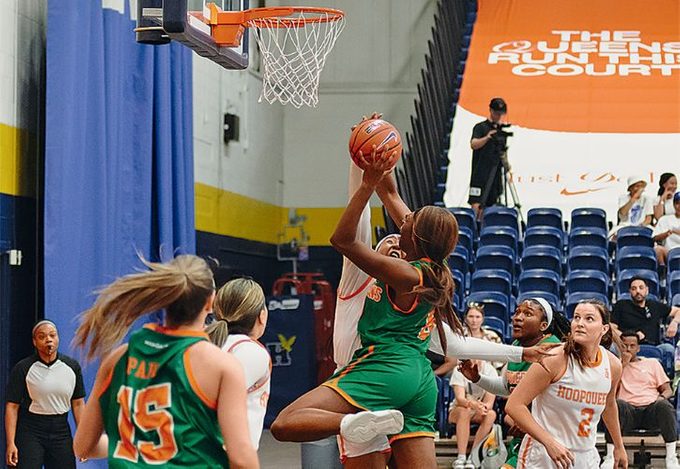This Basketball League Is Breaking the Gender Barrier

Thanks to Hoopqueens, more people are heading back to the court.
Back when Keesa Koomalsingh played basketball in university, she noticed a few irksome things. The lack of female representation within university sports, for one, but particularly the unfair treatment of her fellow women basketball players—they contended with subpar workout conditions, less money and resources than men and fewer opportunities to develop their skills during the off-season and after their varsity careers ended.
Koomalsingh, who is also known as Keesa K, had a successful university sports career, playing at Holland College in P.E.I. and Nipissing University in North Bay, Ont. After she was sidelined with an ACL injury, she started coaching young women with the Canada Elite rep team, an incubator program for elite basketball players that provides support on and off the court. When the pandemic shut everything down, Koomalsingh started thinking about how the sports community could close the gaps between youth sports and professional spaces. “I wanted to see more Black women in stakeholder positions,” she says, “and set a high bar for women’s basketball in Canada.”
Koomalsingh founded HoopQueens in Toronto in 2020. It’s an organization that works to make the basketball court a more inclusive space for women and girls of all ages and skill levels. Today, HoopQueens runs free workshops, a skill development program for youth, a scholarship for athletes, and an adult summer league.“We’ve created this ecosystem of support so that young girls and women stay in the sport,” says Koomalsingh. “Sports teach you a lot. We want those opportunities to be available to underrepresented young girls.”

We know that young women and girls are much more likely to quit sports than their male counterparts. The Rally Report, a 2020 national study on sport participation for Canadian girls, shows that 1 in 3 drop out of sports by late adolescence (unlike 1 in 10 teen boys) for reasons that include the poor quality of the sport experience, negative body image and feeling unwelcomed. Factors such as a lack of resources and funding for women’s sport likely also make a difference. The same study shows just 18 percent of women aged 16 to 63 stay involved in sports.
That’s a shame: Sports, especially team sports like basketball, provide space for socialization, contribute to a more active lifestyle, improve teamwork skills, improve self-esteem and have a positive impact on mental health. A 2022 report from Canadian Women and Sport found that 76 percent of young girls say that sports participation makes them more confident.
Veronica Jamnik, an associate professor at York University who studies exercise physiology for health, sports and physically demanding occupations, points out another benefit of a basketball league like HoopQueens: It’s great for mental health because you get so many opportunities to score. “Sometimes you’ll make shots, sometimes you’ll miss,” she says. However, it’s the ability to keep shooting leads to a sense of empowerment when you do sink a basket.
Then, of course, there are all the physical health benefits that come from shooting, dribbling and traversing a court. Object control and coordination also improve your cognitive function. “You have to make decisions [during the game] and control movements to make a shot or direct the ball,” Jamnik says.
Basketball is also a beautifully accessible sport. Unlike games that require equipment and a particular arena for play, all you need for basketball is a ball and a hoop. It’s easy, especially if you live near a park, to play a game of pick-up.
As women’s basketball surges in popularity in Canada, Koomalsingh says that seeing more women on the court will inspire others to get involved. “Basketball for women has always been around,” says Jamnik, even though it doesn’t get the same attention or support that men’s basketball does. “It’s a fun way to workout, regardless of your skill level. Basketball is great for everyone.”

The health benefits of basketball
First things first: Veronica Jamnik, associate professor of kinesiology at York University, encourages all players to warm up before launching into a game of basketball. Then you can reap the benefits:
Strong bones
All that jumping to sink buckets improves your bone density, says Jamnik. This leads to stronger bones that are more resilient against osteoporosis.
Metabolic conditioning
Basketball involves a lot of fast, explosive movement—great for conditioning your aerobic and anaerobic systems. Similar to HIIT exercises, basketball has you moving intensely and then recovering actively for a shorter period.
Cardio gains
“Basketball is a very fast-paced game that puts stress on the heart and lungs, which is beneficial for cardiovascular health,” says Jamnik.
Cognitive coordination
Skills like making a basket, blocking shots, passing to your teammates, scoring a lay-up and running while dribbling down the court all require muscle coordination that in turn boosts your cognitive health.
A full-body workout
Basketball involves and engages your major muscle groups. Over the course of a game, you’re going to use your arms to throw and dribble, your core to stay stable and your lower body to run and jump.




